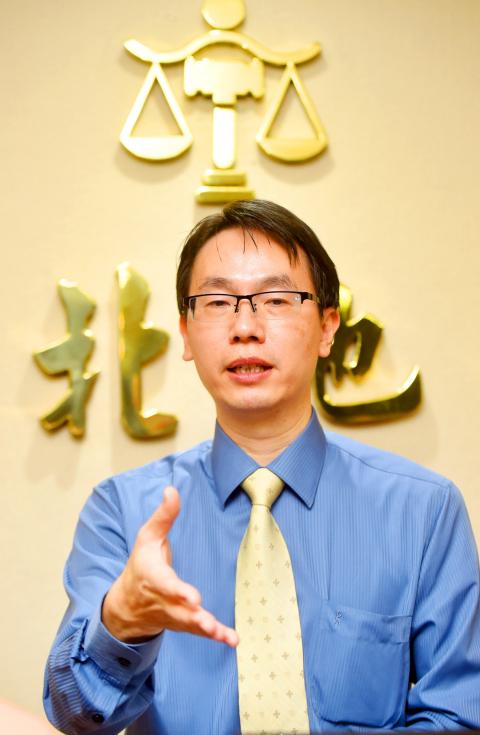The Taipei District Court yesterday acquitted 22 defendants involved in the 2014 Sunflower movement in the first ruling on the case, saying the defendants had legitimate reasons for breaking into the Legislative Yuan on the night of March 18, 2014, based on the principle of “civil disobedience.”
The verdict concerns actions on that day by 22 defendants, including Lin Fei-fan (林飛帆), Chen Wei-ting (陳為廷), Huang Kuo-chang (黃國昌) and Wei Yang (魏揚), who led the protesters or were found to be among the first groups who led protesters through the legislature’s gates, which were being guarded by police officers. The 22 stood trial on charges of inciting others to commit a crime, obstruction of police officers in the discharge of their duties and other crimes.
Taipei District Court Chief Judge Liao Chien-yu (廖建瑜) said the panel of three judges made investigative inquiries, and reviewed theories and practice surrounding the concept of civil disobedience, through literature and research findings on the topic by both Taiwanese and international academics and experts.

Photo: Chien Jung-fong, Taipei Times
The judges studied the concept so that they would be better able to weigh defendants’ and their lawyers’ arguments that their reasons for storming the legislature were legitimate and socially justifiable, because it was an attempt to block the cross-strait service trade agreement, which was being rushed through the legislature by Chinese Nationalist Party (KMT) legislators without consulting the people, Liao told a news conference.
Liao said the judges had summarized the findings and found that the concept of civil obedience rests on seven main requirements:
“Protest activities must be aimed at illegal or unjust actions of major proportion in government or public affairs; activities must be inspired by concern for the public’s interest or have public affairs objectives; the protest activity must recognizably have direct bearing on the subject of the protest; the action should be performed in the public sphere and be non-violent in nature; actions should aid in achieving the stated objective; they should conform to the necessity principle, where there is no other legal and effective means toward the objective; and to the proportionality principle, where the resulting damage should be less than that resulting from the protest and its stated objectives,” he said.
The judges reached their assessment by carefully considering each of the requirements for civil disobedience, looking at the legislative process of tabling the bill for the ratification of the cross-strait service trade agreement, procedures for review by legislative committees, negotiations between the political parties, and approval of the bill through votes in the legislature, according to the ruling.
“It was found that Huang Kuo-chang and the other defendants’ occupation of the legislature on March 18 was in accordance with the seven major requirements for civil disobedience. Also that during nearly a month of occupation, the legislature did not make active efforts to remove the protesters, had attempted to engage in dialogue with protesters, and did not express a wish to press charges through the judiciary during or after the occupation,” the ruling said.

SECURITY: As China is ‘reshaping’ Hong Kong’s population, Taiwan must raise the eligibility threshold for applications from Hong Kongers, Chiu Chui-cheng said When Hong Kong and Macau citizens apply for residency in Taiwan, it would be under a new category that includes a “national security observation period,” Mainland Affairs Council (MAC) Minister Chiu Chui-cheng (邱垂正) said yesterday. President William Lai (賴清德) on March 13 announced 17 strategies to counter China’s aggression toward Taiwan, including incorporating national security considerations into the review process for residency applications from Hong Kong and Macau citizens. The situation in Hong Kong is constantly changing, Chiu said to media yesterday on the sidelines of the Taipei Technology Run hosted by the Taipei Neihu Technology Park Development Association. With

CARROT AND STICK: While unrelenting in its military threats, China attracted nearly 40,000 Taiwanese to over 400 business events last year Nearly 40,000 Taiwanese last year joined industry events in China, such as conferences and trade fairs, supported by the Chinese government, a study showed yesterday, as Beijing ramps up a charm offensive toward Taipei alongside military pressure. China has long taken a carrot-and-stick approach to Taiwan, threatening it with the prospect of military action while reaching out to those it believes are amenable to Beijing’s point of view. Taiwanese security officials are wary of what they see as Beijing’s influence campaigns to sway public opinion after Taipei and Beijing gradually resumed travel links halted by the COVID-19 pandemic, but the scale of

A US Marine Corps regiment equipped with Naval Strike Missiles (NSM) is set to participate in the upcoming Balikatan 25 exercise in the Luzon Strait, marking the system’s first-ever deployment in the Philippines. US and Philippine officials have separately confirmed that the Navy Marine Expeditionary Ship Interdiction System (NMESIS) — the mobile launch platform for the Naval Strike Missile — would take part in the joint exercise. The missiles are being deployed to “a strategic first island chain chokepoint” in the waters between Taiwan proper and the Philippines, US-based Naval News reported. “The Luzon Strait and Bashi Channel represent a critical access

Pope Francis is be laid to rest on Saturday after lying in state for three days in St Peter’s Basilica, where the faithful are expected to flock to pay their respects to history’s first Latin American pontiff. The cardinals met yesterday in the Vatican’s synod hall to chart the next steps before a conclave begins to choose Francis’ successor, as condolences poured in from around the world. According to current norms, the conclave must begin between May 5 and 10. The cardinals set the funeral for Saturday at 10am in St Peter’s Square, to be celebrated by the dean of the College